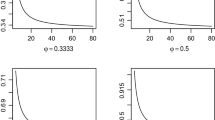Abstract
Suspicion of “physics envy” surrounds the standard statistical toolbox used in the empirical sciences, from biology to psychology. Mainstream methods in these fields, various lines of criticism point out, often fall short of the basic requirements of measurement. Quantitative scales are applied to variables that can hardly be treated as measurable magnitudes, like preferences or happiness; hypotheses are tested by comparing data with conventional significance thresholds that hardly mention effect sizes. This article discusses what I call (with tongue in cheek) “shmeasurement.” To “shmeasure” is to fail to apply quantitative tools to quantitative questions. We “shmeasure” when we try to measure what cannot be measured, or, conversely, when we ask binary questions of continuous measurements. Following the critics of standard statistical tools, it is argued that our statistical toolbox is indeed less concerned with the measurement of magnitudes than we take it to be. This article adds, however, that measurement is not all there is to scientific activity. Most techniques of proof do not resemble measurement as much as voting—a practice that makes frequent use of numbers, figures, or measurements, yet is not chiefly concerned with assessing quantities. Measurement is only one among three functions of the scientific toolbox, the other two being collating observations and deciding which hypotheses to relinquish. I thus make a plea for “shmeasurement”: the mismeasure of things starts to make more sense once we take into account the nonquantitative side of scientific practice.
Similar content being viewed by others
Notes
I took this example from O. D. Duncan’s 1984 book Social Measurement, on which more below. The interpretation (in terms of collations, measurements, etc.) is mine.
Thanks to Ann-Sophie Barwich for drawing my attention to it.
I must apologize for singling out this one paper to raise a much more general problem. The methodological issue at stake here reaches much beyond the work of these two scientists, and beyond the field of happiness research.
My example, not Keller’s or Bookstein’s.
“Cargo cult science,” an expression made popular by Feynman (1974)—refers to Melanesian messianic movements that famously involved imitating the trappings of Western technology, but not its substance: headphones made from wood, airplanes made of straw, etc.
Intricate debates surround the question of knowing whether all measured quantities can in principle be represented with numbers, but I won’t get into those.
References
Berlin B, Kay P (1969) Basic color terms: their universality and evolution. University of California Press, Berkeley
Bookstein FL (2009) Measurement, explanation, and biology: lessons from a long century. Biol Theory 4:6–20
Bookstein FL (2014) Measuring and reasoning: numerical inference in the sciences. Cambridge University Press, New York
Collins HM, Pinch T (1993) The golem: what you should know about science. Cambridge University Press, New York
Comte A (1864) Cours de philosophie positive. J. Baillère et fils, Paris
Cumming G (2013) The new statistics: why and how. Psychol Sci 25:7–29. doi:10.1177/0956797613504966
Duncan OD (1984) Notes on social measurement—historical and critical. Russell Sage Foundation, New York
Feynman R (1974) Cargo cult science. Eng Sci 37(7):10–13
Gigerenzer G (2004) Mindless statistics. J Socioecon 33(5):587–606
Girard C (2010) Acclamation voting in Sparta: an early use of approval voting. In: Laslier JF, Sanver MR (eds) Handbook of approval voting. Springer, Berlin, pp 15–17
Gould SJ (1996) The mismeasure of man. Norton, New York
Hacking I (1990) The taming of chance. Cambridge University Press, New York
Hayek F (1955) The counter-revolution of science: studies on the abuse of reason. Free Press, New York
Keller EF (2010) The mirage of a space between nature and nurture. Duke University Press, Durham
Kuhn TS (1961) The function of measurement in modern physical science. Isis 52:161–193
McCloskey D (2002) The secret sins of economics. Prickly Paradigm Press, Chicago
Michell J (2005) Measurement in psychology: a critical history of a methodological concept. Cambridge University Press, New York
Michell J (2011) Qualitative research meets the ghost of Pythagoras. Theory Psychol 21:241–259. doi:10.1177/0959354310391351
Pacuit E (2012) Voting methods. In: Zalta EN (ed) The Stanford encyclopedia of philosophy. Winter. http://plato.stanford.edu/archives/win2012/entries/voting-methods/. Accessed May 2015
Regenwetter M, Dana J, Davis-Stober CP (2011) Transitivity of preferences. Psychol Rev 118:42–56
Stevens SS (1946) On the theory of scales of measurement. Science 103(2684):677–680. doi:10.1126/science.103.2684.677
Stevenson B, Wolfers J (2013) Subjective well-being and income: is there any evidence of satiation? Am Econ Rev 103:598–604
Tversky A (1969) Intransitivity of preferences. Psychol Rev 76:31–48
Ziliak S, McCloskey D (2008) The cult of statistical significance: how the standard error costs us jobs, money, and lives. University of Michigan Press, Ann Arbor
Acknowledgments
I wish to thank Ann-Sophie Barwich, Fred Bookstein, Evelyn Fox Keller, and Isabella Sarto-Jackson for their valuable input during and after our 2014 workshop. Memories of this event bring us all back to the late Werner Callebaut—his warmth, his competence, his geniality. He is sorely missed.
Author information
Authors and Affiliations
Corresponding author
Rights and permissions
About this article
Cite this article
Morin, O. A Plea for “Shmeasurement” in the Social Sciences. Biol Theory 10, 237–245 (2015). https://doi.org/10.1007/s13752-015-0217-z
Received:
Accepted:
Published:
Issue Date:
DOI: https://doi.org/10.1007/s13752-015-0217-z




